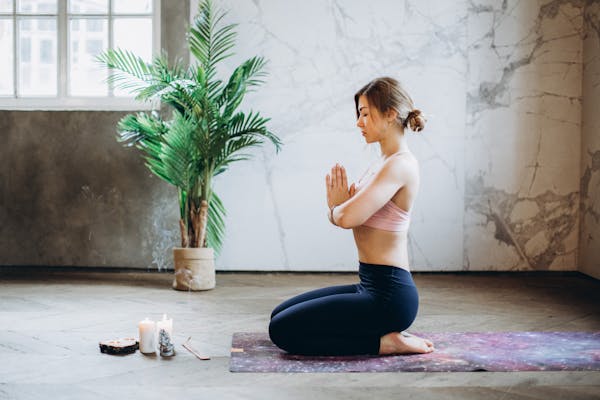Table of Contents

Introduction
Meditation For Anxiety From working life to personal life, anxiety troubles millions of people in today’s fast-paced world. This could be because of problems in work or personal life or due to the pressures shown by society. Anxiety actually does affect life.
Sometimes, one can fight anxiety in a number of ways, but some of the most powerful and effective tools are meditation, especially mindfulness practices that can calm some of the issues that cause anxiety and regain control over your life and improve the quality of your overall well-being.
In this blog post, we dive into how meditation can be a tool to help cope with anxiety, take a look at some of the other mindfulness practices, and provide practical tips on how to include these techniques in daily life.
Understanding Anxiety and Its Effect
Prior to delving into how meditation can be helpful, let us first understand what anxiety is and how it affects individuals.
What is Anxiety?
A little worry is a normal response to stress that works in your favor when you are getting ready for that presentation, but taking a vicious insecurity on your part is when it becomes way too much. It interferes with your everyday functions and brings about countless physical and emotional symptoms.
These can include:
•Continuous Worrying: Continuous and excessive stress over normal situations.
• Somatovegetative Disorders: Palpitation, sweating, shakiness or upset with stomach.
• Psychological Stress: A fear of death ahead, profound sense of awe, fright
• Disorders of Functioning: Inability to think straight, failure to fall or stay asleep at night, avoidance of every situation. Results of Anxiety on Daily Life
It can impact so many different areas of life, from relations with other persons to the performance at work or even how overall well-being is perceived.
Anxiety will lead to avoidance behaviors; as an example, a person may start avoiding people and situations that may remind him or her of something that is causing him or her anxiety and escalating depression that he or she feels.
How Meditation Relieves Anxiety
Meditation has countless scientifically proven mental and physical benefits. Precisely, about anxiety, meditation can help wonders, especially by the means of mindfulness practice Mindfulness.
1. Better Self-Awareness
It has the most profound benefit on meditating for anxiety as it increases self-awareness. Mindfulness exercises allow you to see your thoughts, feelings, and physical sensations without judgment.
You are better aware of your anxiety triggers and responses and can make strategies to better manage and minimize them.
2. It Promotes Relaxation
Well, meditation actually allows the body to promote relaxation through stimulating the parasympathetic nervous system that works to counteract the effects of responses to stress.
It is thus in deep breathing and the focus of attention through which meditation helps reduce symptoms of anxiety by calming the nervous system, providing tranquility.

3. Breaking the circle of ruminations
Too much rumination or overthinking sometimes comes with anxiety. Mindfulness meditation practices may just help teach you the way to shift from staying in your negative thought patterns and toward focusing on the present moment.
That will break the cycle of rumination and therefore prevent the growth of the anxiety concerned.
4. Emotional Regulation Improvement
Meditation helps via regular practices in handling emotions and responding better to stress and anxiety.
Techniques of mindfulness allow one to acknowledge and accept their emotions without control by these emotions, hence better emotional balance and resilience.
5. Reduces Stress
Another major anxiety trigger is chronic stress. Meditation has been shown to decrease cortisol levels, which is a stress hormone.
If you can associate meditation with your daily activities, then surely you can deal with stress comfortably and live with just a little less anxiety.
Practices of Mindfulness to Counter Anxiety
Mindfulness is an integral part of most meditations and one of the most effective ways to tackle anxiety. Here are some mindfulness practices you could try:
1. Mindful Breathing
Mindfulness How It Works: Mindful breathing helps anchor your mind in the present and to settle the nervous system. Focus on the breath can interrupt worried thought loops and bring relief.
Practice:
Sit up with relaxed back and shoulders.
Close the eyes and inhale slowly through the nose, so that the abdomen distends.
Exhale slowly and completely through the mouth or nose.
• Maintain awareness of the sensation of your breath moving in and out of your body.
• When the mind wanders, just bring your attention gently back again and again to your breath.
2. Body Scan Meditation
How It Works: Body scan meditation is a technique in which the brain methodically focuses attention on various parts of the body. It makes you more sensitive to somatic sensations and reduces tension.
Such a practice is really potent in the case of dealing with anxiety-related somatic symptoms.
How to Practice it
• Sit or lie down and close your eyes.
• For example, you might focus your attention on your toes, and then move it up, scanning through the feet and legs, torso, arms, and head.
• Then, bring consciousness to each part of your body and scan to see if you find any sensations or tension.
• That being an opportunity, breathe into the space you notice in order to, with every exhale, envision letting go of that felt tension.
3. Observations with Mindfulness
How It Helps: Intentional observation is directing attention to the present moment by seeing things without judgment.
The practitioner will be able to settle in one’s present and reduce anxiety through distrusting worries inside oneself by moving the mind out of self.
How to Practice:
•Choose an object or scene to observe, such as a flower, a piece of artwork, or a natural landscape
•Get as comfortable as possible and settle in to really observe the chosen object.
•Pay attention to its unique details: the colors, shapes, textures, and movements.
• Notice how it looks from all angles, what happens to your senses through sensing it, and if it has a kind of life inside it.
• Allow yourself to be completely concentrated on watching without being driven or judgmental.
4. Loving-Kindness Meditation
How It Helps: With the cultivation of loving-kindness and acceptance of oneself, loving-kindness meditation acts as an antidote to anxiety through promoting pleasant emotion and reducing self-criticism that results when anxious.

How to Practice:
• Sit comfortably and close your eyes.
• Focus on yourself first and whisper to yourself, “May I be happy, May I be healthy, and May I be at peace.”
•Expand this to other persons: first your family members, then friends, later on all beings.
•Picture showering a specific person with love and kindness by speaking to them repeatedly.
5. Guided Imagining
How It Can Help: Directed visualization is the act of imagining a calm or beautiful scene to evoke a sense of calm.
This can help with anxiety because it shifts your focus away from what might be putting you under stress to a state of relaxation.
How to Do it
Select a quiet, comfortable place to sit or lie.
Close your eyes and take a few deep breaths.
• Continue to listen to a guided meditation recording or use a script to create the surroundings of an ideal place you found relaxing, like a beach, a forest, or a meadow.
• Use all of your senses in your visualization of what you are seeing, hearing, smelling, and feeling
• Consent to yourself fully into those soothing impressions and sensations.
Establishing a Meditation Practice for Anxiety
Mindfulness Develop a regular daily meditation practice to address anxiety positively. Here’s how you can build a practice to be consistent for you:
1. Set Realistic Goals
Start with very short periods of meditation and then continue to increase the period with time as you get used to it. Even just a couple of minutes a day might make all the difference in a world to try to address anxiety.
2. Establish a Suitable Time
The best part about meditation is that it can be practiced at any given time of the day according to your schedule, and sticking to a particular time makes the process habitual and ensures that meditation takes its due space in your life.
3. Choose Comfortable Space
Choose a quiet and comfortable space for meditation. Engage cushions, chairs or mats to make the ambiance inviting and relaxing.
4. Guided Meditations
For beginners, guided meditation is a good starting point with some structure and support. There are literally thousands of apps and online tools including guided meditations specifically focused on anxiety.
5. Be patient and consistent
Meditation is not learned overnight but over a period of time, and is developed with great effort. So be gentle with yourself and persistent with your approach over a period of time and you might find a general feeling of being better equipped to handle anxiety and improving your general wellbeing.
Supplement meditation with other strategies
Meditation is a great tool to help manage anxiety, but it’s often much more potent when combined with other techniques. You could add the following techniques in addition to your global scheme of anxiety management.
1. Physical Exercise
Exercise reduces anxiety through the release of endorphins and changing one’s mood. Start with easy activities like walking or jogging; you could also opt for yoga and add it to your meditation schedule.
2. Balanced Lifestyle Choices
Balance yourself and get adequate rest. The best self-care maintenance for good mental health keeps you tapping the best from meditation.
3. Professional Help
If your anxiety stays with you or builds up, then you might turn to professional aid. Consultation at the mental clinic will best complement meditation with therapy, counseling, or medication for problems.
4. Stress Management Techniques
In combination with other de-stressing techniques, including deep breathing, progressive muscle relaxation, or techniques in time management, it will reduce anxiety even more.
Science: Do the Right Thing to Reduce Anxiety
Science evidence for meditation has been well supported by reducing anxiety. Meta-analysis of mindfulness-based interventions results to demonstrate that after treatment, substantial reductions were reported in anxiety symptoms and overall mental functioning. Some of the main findings were:
•Reduced symptoms of anxiety: Some research demonstrates that mindfulness meditation results in reduced symptoms of anxiety by relaxing and having good emotional control.
•Improved Brain Activity: It has been concluded that meditation could change brain activity in parts utilized to relate to stress and emotional response, thus possibly reducing anxiety.
• Stress Resistance: The stress-resisting ability increases with the continuity of practice, and one is likely to cope with any anxiety-eliciting situations.
Mindfulness-related meditation for anxiety acts as a holistic approach to manage as well as curtail anxiety. It does so by promoting self-awareness, relaxation, breaking the cycle of ruminating thought, and increasing emotional regulation and thus providing relief from symptoms of anxiety.
In addition to mindful breathing, he needs to practice body scan meditation as well as loving-kindness meditation so that the full benefits can be obtained after establishing them as habits.
Practice this ability to meditate consistently, with other strategies, without discouraging yourself when you are trying to hone this valuable skill.
Mindfulness Remember also that meditation is not a magic cure, but rather a complement to your overall approach to anxiety. You will be able to use the power of meditation and make your life better and richer only with regular practice and the right attitudes.

